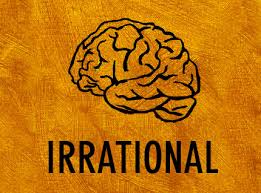irrational
英 [ɪ'ræʃ(ə)n(ə)l]
美 [ɪ'ræʃənl]
- adj. 不合理的;无理性的;荒谬的
- n. [数] 无理数
CET6 TEM4
- irrational (adj.)
- late 15c., "not endowed with reason" (of beats, etc.); earlier (of quantities) "inexpressible in ordinary numbers" (late 14c.); from Latin irrationalis "without reason," from assimilated form of in- "not, opposite of" (see in- (1)) + rationalis "reason" (see rational). Meaning "illogical, absurd" is attested from 1640s. Related: Irrationally.
- 1. The rational and the irrational complement each other. Individually, they are far less powerful.
- 理性和非理性是互补的。两者分开的话,力量就会小很多。
来自美剧《纸牌屋》
- 2. His behaviour was becoming increasingly irrational.
- 他的行为变得越来越不理智了。
来自柯林斯例句
- 3. The weight of irrational guilt pressed on her.
- 无端的负罪感压得她喘不过气来。
来自柯林斯例句
- 4. After taking the drug she became completely irrational.
- 她在吸毒后变得完全失去了理性.
来自《简明英汉词典》
- 5. Strong irrational dislikes of other people can easily be picked up from others.
- 对他人无端的厌恶之情别人可以轻易察觉到。
来自柯林斯例句
[ irrational 造句 ]
